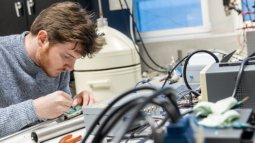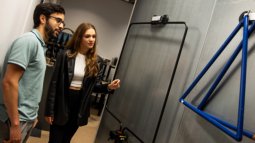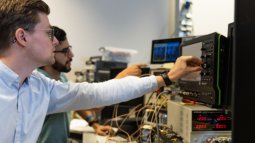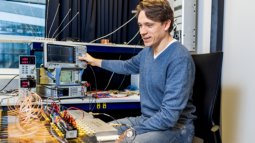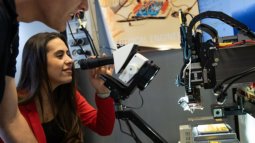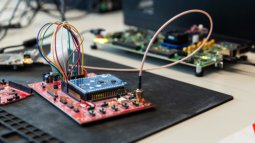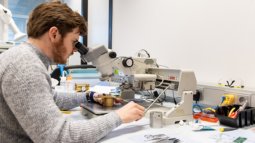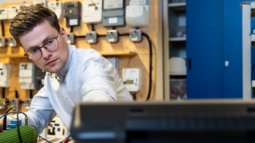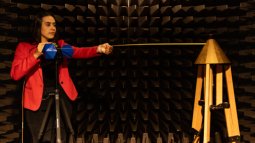Shape the future of electronics by developing novel electronic devices and systems, from circuits to sustainable energy technologies.
Electrical engineering is the foundation of technological progress in many fields, such as healthcare, manufacturing, transportation, aerospace, and the automotive industry. Do you want to push the boundaries of what is possible in electrical engineering? Think of innovating chip architecture, researching alternative components to replace transistors in current electronic devices, and making 3D printed sensors. What about improving medical imaging technologies, such as MRI and X-rays, along with developing implantable and wearable medical devices? Electrical engineering also plays a pivotal role in the ongoing energy transition, offering you immense opportunities to contribute to our future. You can enhance solar cell efficiency, facilitate sustainable chip manufacturing processes, and optimise power grids for compatibility with renewable sources like solar and wind energy. If you want to engage in impactful research and innovative technologies that will shape the future of electronics, the Master’s in Electrical Engineering at the University of Twente is the right choice for you!
In this two-year, English-taught Master’s, you will research, design, analyse, develop, and optimise electrical components and systems for a wide range of applications, such as smartphones, computers, medical devices, power grids, vehicles, or manufacturing processes. This Master’s places a strong emphasis on signal processing and analysis as well as on the design and development of electrical components and systems. You will have the opportunity to contribute to the advancement of technologies like solar cells, AI-assisted pattern recognition, and smart sensors.
Start Master’s in Electrical Engineering
You can start your studies in September or February. If you need to follow the Pre-Master's first, you can only start in September and continue with your Master's in February.
Choose a specialisation
You have a lot of freedom to customise your Master’s in Electrical Engineering to your interests and ambitions. Do you want to explore wireless communication and sensing systems? Or does the biomedical aspect of electrical engineering pique your curiosity? Perhaps you are eager to optimise the efficiency of energy systems or to innovate integrated circuit designs. Have you considered delving into nanoscale device and system development? Within this Master’s, you will develop a unique expertise in a specific domain by choosing one of the eleven specialisations. Your choice determines what courses you will take and the research in your master’s thesis. You can opt for one of the following specialisations or combine two:
Biomedical Signals & Systems
In this specialisation, you will learn to engineer hardware and software that prevent, diagnose and treat sensory or motor dysfunction of the human body.
2 yearsFull-timeEnglish
Communication Networks
Digital communication, internet access, and data storage rely on networks. Want to make them faster, safer, and more reliable? Then this specialisation is for you.
2 yearsFull-timeEnglish
Computer Vision and Biometrics
In this specialisation, you will learn to design systems with biometric data such as fingerprints or facial recognition, to contribute to better diagnoses, secure identification, and more.
2 yearsFull-timeEnglish
Dependable Integrated Systems
This specialisation teaches you to develop reliable and trustworthy computing systems that can withstand any failure and provide secure, uninterrupted service.
2 yearsFull-timeEnglish
Integrated Circuit Design
Integrated circuits, or chips, give power to countless systems, from your phone to medical devices. This specialisation teaches you to design smaller, more powerful, and energy-efficient chips.
2 yearsFull-timeEnglish
Integrated Optical Systems
In this specialisation, you will learn to create advanced integrated optical systems for faster and more sustainable communication systems, sensors, and healthcare imaging.
2 yearsFull-timeEnglish
Micro Sensors & Systems
This specialisation teaches you to design micro sensors and systems that monitor motion, light, pressure, and more – vital for domains like healthcare, safety, and environmental monitoring.
2 yearsFull-timeEnglish
Nano Electronics
This specialisation teaches you to design nanoscale electronic devices for future electronics with lower power use, longer battery life, and better conductivity.
2 yearsFull-timeEnglish
Power Electronics
Want to play a role in the energy transition and reduce CO2 emissions? This specialisation helps you to design efficient power electronics for sustainable energy, electric vehicles, and smart devices.
2 yearsFull-time
Radio Systems
Today’s interconnected world is increasingly reliant on wireless technologies. This specialisation teaches you to design, analyse, and optimise radio systems for telecommunications, IoT and more.
2 yearsFull-timeEnglish
Semiconductor Devices & Technology
Semiconductors are the foundation of chips and electronics. In this specialisation, you’ll explore sustainable materials and technologies to design faster, energy-efficient semiconductors.
2 yearsFull-time
Career perspectives
Electrical engineers are in high demand across many industries, such as healthcare, energy, aerospace, manufacturing, and telecommunications. Your expertise in designing, developing, and optimising electrical devices and systems will open up a variety of career opportunities in both the public and private domains. You can find a job at technology giants, IC design houses, semiconductor and microelectronics manufacturers, power plants, renewable energy companies, aerospace centres, research and development institutions, and security firms, among others. Most alumni secure a job well before graduating. Within the programme there are collaborations with the industry through guest lectures, projects and a mandatory internship.
Job opportunities for electrical engineers
There is a growing need for electrical engineers with strong research skills and specialised technical knowledge in electrical systems. You will find a wide range of career opportunities including roles such as a design and process engineer, control systems engineer, data analyst, biomedical engineer, or research and development scientist. You can also opt for a career in academia and do a PhD at a university anywhere in the world. Or you can start your own company!
Programme overview
Related programmes
Below you find a list of educational programmes which are (closely) related to Electrical Engineering.
Engineering & Technology
Applied Mathematics
Expand your understanding of mathematics to tackle challenging issues in a variety of sectors. This Master’s teaches you to discover new patterns and predict them through mathematical models.
Applied Physics
Deepen your understanding of the laws of physics to find technical solutions in a wide range of areas such as IT, sustainability, healthcare, chiptechnology, digitalisation, finance, space and more.
Biomedical Engineering
Technological advances are at the heart of innovation in healthcare. In this master's, you'll learn to develop medical innovations that contribute to better care, from organ-on-a-chip to exoskeleton.
Business Information Technology
Become an expert in IT-based business innovation, able to devise new services and radically improve the way businesses work.
Chemical Science & Engineering
Develop new chemical processes, materials and molecules and contribute to innovations that benefit our society in areas such as health, water, food and sustainability.
Civil Engineering & Management
Do you want to work on future-proof solutions in the construction, water and/or transport sector? Learn to manage civil engineering projects with an eye for both technical and non-technical aspects.
Computer Science
Become an expert computer scientist and learn to solve the biggest challenges of our digital society by designing and developing more secure and efficient ICT systems.
Construction Management & Engineering
Become an expert in managing large-scale, complex construction projects in an increasingly digitised industry, using an innovative, integral approach.
Embedded Systems
Become an expert in designing the software and hardware of complex embedded systems in vehicles, pacemakers and chipsets, amongst others.
Humanitarian Engineering
Do you want to tackle complex humanitarian crises worldwide? This Master’s helps you develop sustainable, socio-technological solutions to challenges faced by underserved and marginalised communities.
Industrial Design Engineering
Do you want to design innovative products that improve daily life and address today’s challenges? In this Master’s, you combine design and engineering to enhance both products and product development.
Industrial Engineering & Management
Combine technical expertise with management skills to analyse, improve, and future-proof complex business processes in (international) organisations.
Interaction Technology
Delve into the field of human-computer interaction and design and develop intelligent and interactive technologies that are meaningful to people and society.
Mechanical Engineering
Become an expert mechanical engineer who focuses on the futureproof design, analysis and maintenance of machinery, structures, products and production processes.
Nanotechnology
Tackle big challenges on the tiniest scale: become an expert in nanotechnology and develop smart, innovative solutions for major societal issues in healthcare, ICT and sustainability.
Philosophy of Science, Technology & Society
How does technology shape our lives and the world we live in? Learn to understand the role of modern technology in our society from a philosophical perspective.
Robotics
Become an expert in robotics: design smart, human-centred robots and combine AI, mechatronics, systems integration and ethics to make a real impact in industry and society.
Spatial Engineering
Natural disasters, poverty, food shortages, epidemics, and climate change: learn to tackle society’s greatest and complex challenges using spatial data and technical and socio-economic knowledge.
Sustainable Energy Technology
Work towards the energy transition! In this Master's, you will learn to conceive, develop and apply sustainable energy solutions for a future without fossil fuels.
Technical Medicine
This Dutch-taught Master's equips you to use AI, medical imaging and smart sensors to improve diagnoses, personalise treatments and safely apply technology in clinical practice.

